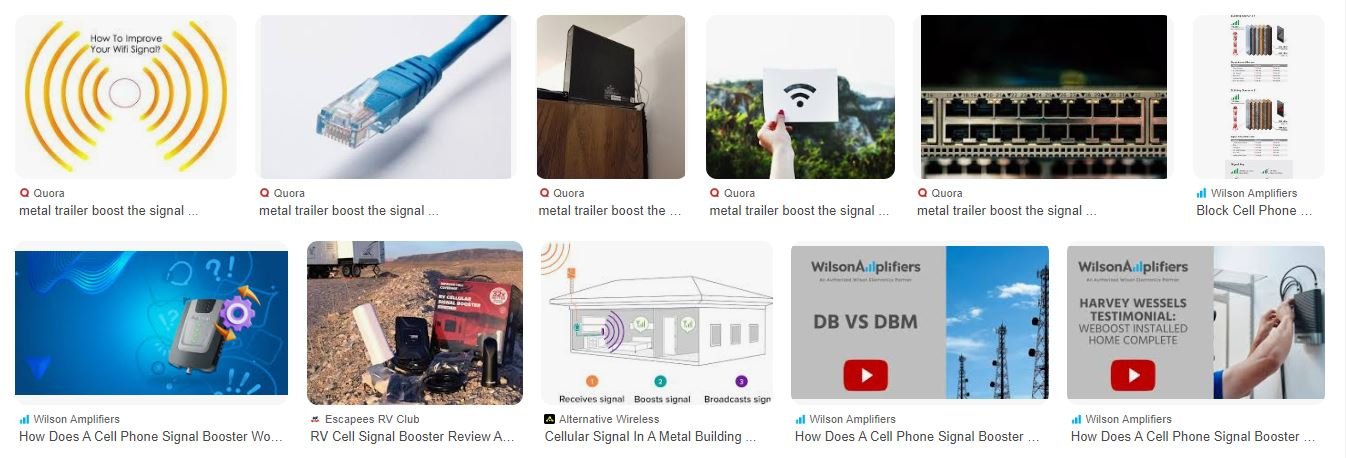Introduction
In today’s hyper-connected world, maintaining a strong 4G signal is crucial for staying in touch, accessing information, and navigating daily tasks. However, various factors can interfere with cell phone signals, leading to poor reception and frustrating dead zones. One such factor that often goes unnoticed is the impact of a metal trailer on 4G signal strength.
Understanding the Basics of Cell Phone Signals
What Are Cell Phone Signals?
Cell phone signals are radio waves transmitted from cell towers to your device. These signals are measured in decibel milliwatts (dBm), and their strength can significantly affect your phone’s performance. A signal strength of -50 dBm is considered excellent, while a signal of -120 dBm is practically unusable.
How Do Metal Structures Affect Cell Phone Signals?
Metal is a known barrier to radio waves. When inside a metal structure, such as a trailer, the metal can block or reflect the radio waves, preventing them from reaching your device. This can lead to poor cell phone signal, creating dead zones where you might need help to make calls, send texts, or use data services.
The Impact of Metal Trailers on 4G Signal Strength
Interference and Signal Blocking
A metal trailer can significantly interfere with cellular signals. The metal walls act as a barrier, blocking the signals from penetrating inside. This effect can be more pronounced in areas with weak signals, leading to situations where the signal inside the trailer is non-existent or extremely poor.
Reflection and Signal Loss
Metal surfaces can reflect cell signals away from your device, causing a loss of signal strength. This reflection can scatter the signal in different directions, making it difficult for your phone to maintain a stable connection. As a result, you might notice fluctuating signal bars and a decrease in data speeds.
Measuring Signal Strength: Understanding Decibel Milliwatts (dBm)
What Is dBm?
Decibel milliwatts (dBm) is a unit of measure used to express the power level of a signal. In the context of cell phone signals, it indicates the strength of the signal received by your phone. The scale is logarithmic, meaning that a slight change in dBm represents a significant change in signal strength.
Ideal Signal Strength
- -50 dBm: Excellent signal strength.
- -60 dBm to -70 dBm: Good signal strength.
- -80 dBm to -90 dBm: Fair signal strength, with potential issues.
- -100 dBm to -120 dBm: Poor signal strength, leading to connectivity issues.
How to Measure Signal Strength
Most smartphones allow users to check signal strength in dBm through the settings menu. This can provide a more accurate indication of your signal quality than the number of bars displayed on your screen.
Practical Solutions to Improve 4G Signal Strength in a Metal Trailer
Signal Boosters
A signal booster, a cell phone signal repeater, can amplify weak signals and improve cell reception inside a metal trailer. These devices consist of an external amplifier and an internal antenna. The external antenna captures the weak signal from the outside, the amplifier boosts it, and the internal antenna broadcasts the strengthened signal inside the trailer.
External Antennas
Installing an external antenna on your metal trailer can help capture stronger signals from cell towers. These antennas are designed to be mounted outside the trailer and can significantly improve signal reception. Pairing an external antenna with a signal booster can provide even better results.
Positioning and Orientation
Properly positioning your phone and any external antennas can improve signal strength. For example, placing your phone near windows or open spaces where the signal might be stronger can help. Similarly, orienting external antennas towards the nearest cell tower can optimize signal capture.
Avoiding Signal Interference
Minimizing interference from other electronic devices and structures can also improve your 4G signal strength. Keeping your phone away from other metal objects and large electronic appliances can help reduce signal blockage and reflection.
Common Questions and Answers
Can a Metal Trailer Create a Dead Zone?
Yes, a metal trailer can create a dead zone by blocking or reflecting cell signals, making it difficult for your phone to maintain a connection.
What Is a Dead Zone?
Cell phone signals are weak or non-existent in a dead zone, resulting in poor cell reception and connectivity issues.
How Can I Improve Cell Phone Signal in a Metal Trailer?
Using a signal booster, installing external antennas, and positioning your phone near windows or open spaces can help improve cell phone signal in a metal trailer.
What Is the Ideal dBm for Cell Signals?
An ideal dBm for cell signals is around -50 dBm, which indicates excellent signal strength. A signal strength of -60 dBm to -70 dBm is considered good, while -80 dBm to -90 dBm is fair but may lead to connectivity issues.
Are Signal Boosters Effective?
Signal boosters amplify weak signals and improve cell reception inside metal structures like trailers.
Final Thoughts
Living or working in a metal trailer can present challenges in maintaining a strong 4G signal. The metal structure blocks or reflects cell signals, leading to poor cell phone reception and frustrating dead zones. However, practical solutions such as signal boosters and external antennas can significantly improve your cell reception and ensure you stay connected.
By understanding the impact of metal structures on cell signals and implementing the right solutions, you can enhance your 4G signal strength and enjoy seamless connectivity, even inside a metal trailer.
Sources
For more detailed information, you can visit the following websites:
By following these guidelines and understanding the challenges of metal structures, you can ensure that your 4G signal remains solid and reliable, keeping you connected wherever you are.
What is Fintech Zoom? Comprehensive Guide
Shop Ferguson Tartan for Elegant & Classic Styles from Scottish Kilt










